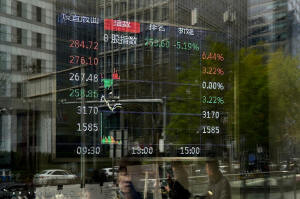|
Putting “America First” over international rules harms the
stability of global production and the supply chain and
seriously impacts the world's economic recovery, Foreign Affairs
spokesperson Lin Jian told reporters.
Last week, Trump put an additional 34% tariff on Chinese goods
as part of “Liberation Day,” coming on top of two rounds of 10%
tariffs already declared in February and March, which Trump said
was due to Beijing’s role in the fentanyl crisis. China and
other governments retaliated quickly. China announced its own
34% tariff rate on U.S. goods, mirroring Trump's tariff rate for
China.
On Monday, Beijing struck a note of confidence even as markets
in Hong Kong and Shanghai tumbled. The People’s Daily, the
Communist Party’s official mouthpiece, had strong words. “The
sky won’t fall,” it declared, even if the U.S. tariffs have an
impact.
“Faced with the indiscriminate punches of U.S. taxes, we know
what we are doing and we have tools at our disposal," it added.
Beijing had announced a slew of countermeasures Friday evening
aimed at Trump’s tariffs. As part of these measures, China
suspended sorghum, poultry and bonemeal imports from some
American companies, and put more export controls on rare earth
minerals, critical for various technologies, while launching a
lawsuit at the World Trade Organization.
It is unknown if China's leader, Xi Jinping, will meet with
Trump to make a deal on the tariffs. Lin directed questions
about a possible meeting to other departments.
“Pressure and threats are not the way to deal with China. China
will firmly safeguard its legitimate rights and interests,” Lin
added.
Still, over the weekend, Chinese government officials met a slew
of American business representatives including for Tesla, GE
Healthcare and others.
“The root of the tariff problem is in the U.S.,” said Ling Ji, a
vice minister of Commerce, at the meeting with the 20 American
companies, according to a readout of the meeting. "We hope the
American companies can address the problem at its root, ...
issue reasonable statements, take concrete actions, and work
together to safeguard the stability of the global supply chain.
Ling also promised that China will remain open to foreign
investment and that it was safe to invest.
——
AP researcher Yu Bing contributed to this report from Beijing.
All contents © copyright 2025 Associated Press. All rights reserved

|
|




